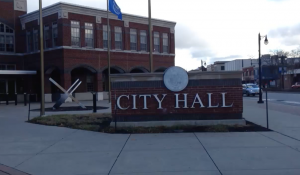Story By Ian Lopez
Part Three: ChicagoTalks’ urban affairs series
May 28, 2009 – It was a regular day in Summar Othman’s English class as students waited to present their research papers. Othman, a devout Muslim and DePaul University student, was still getting used to her new school. One of the few students on the campus to wear a traditional Muslim head scarf known as a hijab, she felt awkward and alone when a student raised his hand and proclaimed that his research findings proved that Islam was the only religion that accepted prostitution.
“I felt a bit scared,” Othman recalled of that defining moment during her freshman year. “I didn’t want to raise my hand and be ‘that Muslim kid’, but I also wanted to clear up the misconception.”
Othman did end up raising her hand that day, and was glad she did. She explained the misconception and pointed out how her classmate’s sources taken from the internet were not very credible. The moment left Othman with a sense of comfort, and she was surprised to find that other students had a positive reaction.
This wasn’t the first time Othman has felt these feelings of isolation. Stepping onto a Catholic University’s campus after spending all of her academic life in schools that she said were “100 percent Muslim,” Othman was surprised to find herself being the minority for the first time in her life.
There’s evidence that students like Othman with religious convictions different from the majority of Americans have a reason for concern.
The DePaul Conservative Alliance, a student organization that promotes conservative values, held Terrorism Awareness Week at DePaul. The event was formerly known as Islamabad Fascist Week. Othman said she felt it was a direct target for Muslim students. Othman said the group has a history of trouble with other student groups making it necessary for the group to hire security at some events.
“It was some of the worst discrimination I’ve seen in my entire life,” said Othman.
The event included lectures that linked Islam directly to 9/11, and a description of Jihad that Othman said was both wrong and played off of a media frenzy. There was also a screening of the film Obsession , which according to Othman negatively depicts Muslims by focusing entirely on extremists.
“One percent of us doesn’t speak for the religion of millions of people,” she said. “I was really glad I was there to [comment] about Islam.”
“A lot of misconceptions have been created about Muslims from the media,” Othman said. “[The media] associate us with the extremists and caused stereotypes of us and the faith to emerge. “
Othman feels that those misconceptions have set the stage for public discrimination against her faith as well as others.
Discrimination on the basis of religion isn’t limited to students at campuses in Chicago. The city’s Commission on Human Relations reported that in 2008 nearly 13 of the 72 hate crimes were based on religion. Late last year, a Molotov cocktail was thrown at one of Chicago’s oldest temples, Temple Shalom, at 3480 N. Lakeshore Dr.
Luckily for students like Othman, there are student groups at colleges and universities in Chicago that serve as meeting grounds for those wanting to express and discuss their beliefs with other members of their faiths, giving them a sense of community and shelter from outside criticism.
Othman is the Vice President of United Muslims Moving Ahead (UMMA), a DePaul student group that allows Muslims and others to participate in the practices of Islam. UMMA also works with an interfaith initiative aimed at talking and helping with other faith-based student groups at the university. Within their own organization, the group organizes meetings, hosts movie screenings, holiday parties, dinners, prayer services and lessons on everything from charity to the life of the profet Muhammad.
“Muslims on campus need a space where they can talk about religion and have someone to turn to with matters and questions of faith,” Othman explained. “We aim to break down barriers and misconceptions.”
Ty Turley, a student at the University of Chicago and president of the Later Day Saint Student Association, is another local college student who has felt faith-based discrimination. Unlike Othman, his feeling doesn’t stem from the attacks of other student organizations. He said everyone at his college has been very respectful about his religion.
“I feel as if students here are more intellectual,” Turley said. “We discuss and debate [aspects of LDS faith], but people [at the University] are thoughtful.”
However, “media portrayal, especially over the last year, hasn’t been that fair,” Turley said. “Personally, I felt discontent and ill treated, and that some (news) stories seem anti-Mormon.”
Turley said his views were the result of allegations that former presidential candidate Mitt Romney, a Mormon, would be upholding Mormon ideology and using it to influence U.S. policy and lifestyles, and that he would also be upholding a Mormon prophecy.
Also seen as unfair by Turley were actions and protests against Mormons after the LDS support for California’s Proposition 8 and other efforts around the country to ban same sex marriages. Turley said the student LDS gives him a type of community not easily found around the country.
It’s an experience Othman shares at DePaul.
“Muslims on campus need a space where they can talk about their religion,” she said. “They need a group so they have people like them to talk about it with.”






Be First to Comment